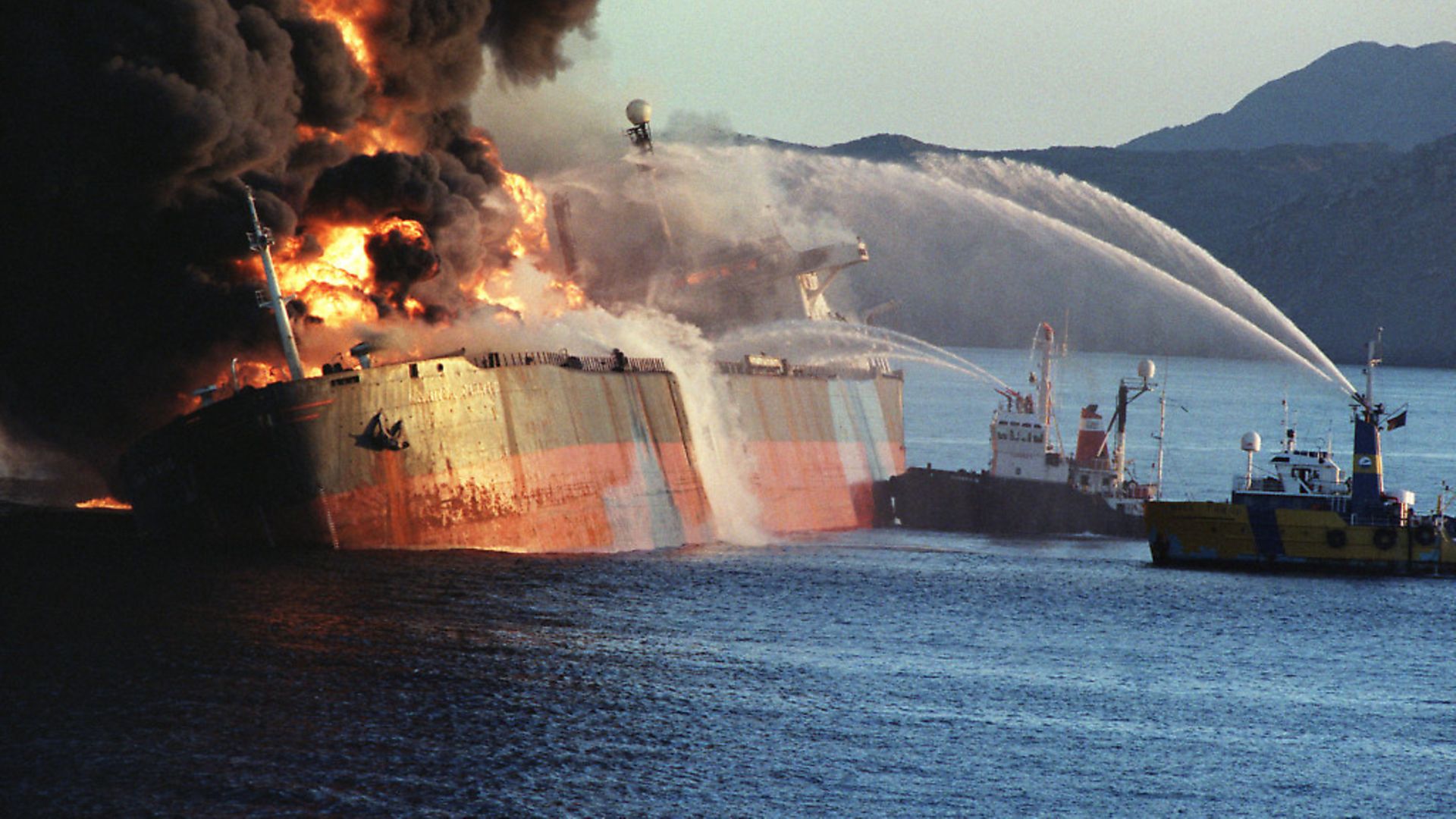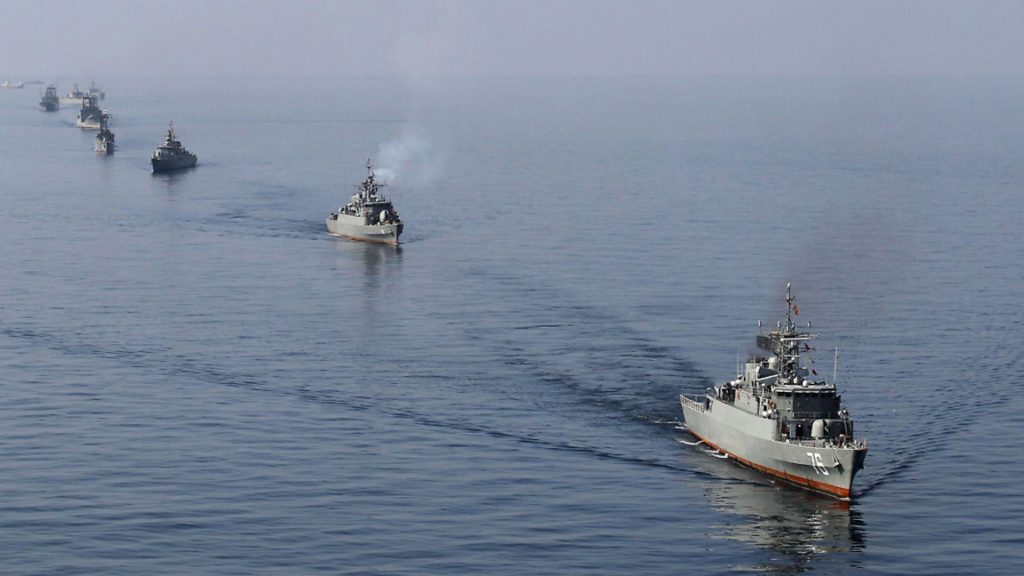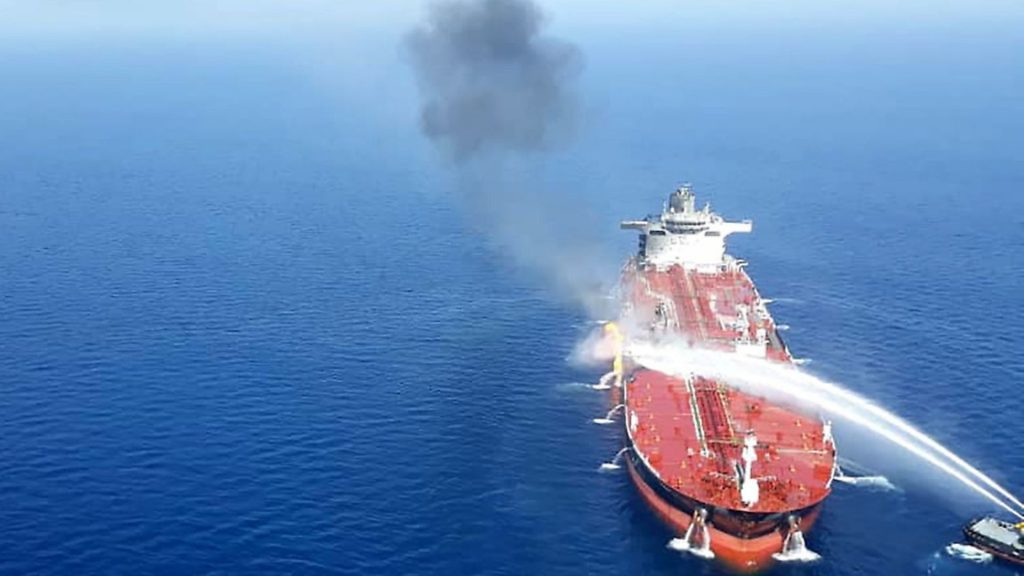
There is a certain geopolitical inevitability to the location for Donald Trump’s showdown with Iran. PAUL KNOTT reports on the significance of the Strait of Hormuz, one of the globe’s great choke points.

Donald Trump shows no signs of being a student of history. Let’s allow that his recent reference to the capture of “airports” by the Continental Army during the American Revolutionary War against Britain in the late 18th century was a slip of the tongue.
More serious is his reckless policy towards Iran, which suggests he knows nothing of the ‘Tanker War’, which occurred in the Persian Gulf between 1984 and 1987.
Indeed, given the much-documented chaos in his administration, one wonders whether anyone in the White House is bearing past precedents in mind when developing current strategy. This omission matters because the looming repeat of a battle targeting commercial shipping could cause immense human and economic damage.
The shipping industry is the crucial but largely unseen circulatory system of our globalised world. As described in Rose George’s engaging book on the subject Deep Sea and Foreign Going, the roughly 100,000 ships – some the size of football pitches – of the international commercial fleet fetch and carry some “90% of everything” we need and consume. This includes “the clothes on your back, the fuel in your car and the food on your plate”. Stop the shipping industry and you stop the world.

Even a partial disruption of global shipping can cause considerable problems. And the growing tensions between the United States and Iran are threatening to do exactly that.
A series of six attacks on merchant ships in the Persian Gulf took place in May and June. These involved controlled explosive devices being placed on the vessels’ hulls to hole them above the water line. No loss of life or cargo ensued. Despite Iran’s protestations that these attacks were ‘false flag’ operations designed to discredit it by its enemies, most international observers judge them to be warning shots by Tehran. In their view, they were intended to demonstrate the damage Iran could inflict on global shipping in response to any military conflict initiated by the US.
The potential scale of the disruption Iran could cause is huge.
The Strait of Hormuz is a narrow shipping artery between Iran and Oman. Approximately one-third of the world’s seaborne crude oil exports pass through the strait – just 21 nautical miles (39km) wide at their narrowest point – on their way from the Persian Gulf to customers in Asia, Africa, Europe and the Americas.

As well as Iraq and Iran itself, these crucial supplies come from US allies and Iranian enemies such as Saudi Arabia, Kuwait and the United Arab Emirates. There are no significant alternative routes.
The geography of the Strait of Hormuz compels shipping to pass close to Iranian territorial waters and gives Iran ample opportunity to disrupt it. The speed and ease of access to the strait from Iran’s nearby naval ports enables its special forces and fleet of fast patrol boats to engage maritime traffic very quickly.
Iran could also further escalate warfare against merchant ships. This was amply demonstrated during the Tanker War phase of the 1980-88 Iran-Iraq War, a bloody conflict that resulted in more than a half a million deaths.
Like the main conflict itself, the Tanker War was actually initiated by Saddam Hussein’s Iraq. In 1984, it began aerial bombing of Iranian oil installations and tankers, including ships from other nations carrying oil supplies from Iranian ports. Saddam’s objective – like Trump’s today – was to cripple the economy of his Iranian adversaries.
Iran initially threatened to close the Strait of Hormuz in response. Few experts doubted that it could have done so. But Iran was ultimately more restrained, opting to restrict its reciprocal assaults exclusively to Iraqi merchant ships.
Even so, hundreds of civilians were killed in the attacks. The first phase of the Tanker War caused a 25% drop in commercial shipping and a sharp rise in the crude oil price. Other costs, such as shipping insurance premiums, skyrocketed too.
The difference with today’s incipient conflict is that the Tanker War was a by-product of Iran’s wider war with Iraq. The current assaults on shipping could be a central factor in sparking a full-blown war between Iran and the US, and become Iran’s main weapon in it.
Iran’s armed forces are substantial but still no match for the US military in a conventional battle. Nor does Iran have any scope to reciprocate the US’s attempts to strangle it economically through sanctions. These realities may incentivise Iran to make the most of the strategic advantages it does have – blocking the Strait of Hormuz and exploiting the vulnerability of merchant shipping.
Tragically, the accelerating tensions in the Persian Gulf were entirely avoidable. They are a direct result of Trump’s decision to tear up the Joint Comprehensive Plan of Action (JCPOA), better known as the Iran nuclear deal, and to impose his policy of maximum pressure on Tehran instead. Trump claims his harsh sanctions will force Iran to submit to another deal on worse terms covering a range of issues beyond its nuclear programme.
Iran has a long history of resisting such pressure. To some extent, Tehran will be aided on this occasion by the US’s isolation as the only country eager to enforce new sanctions against it.
Equally, it already became clear during the difficult, decade-long negotiation of the nuclear deal that attempts to include other issues in it, such as Iran’s interference around the Middle East, would get nowhere. Instead, the negotiators anticipated that the trust built by the successful implementation of the JCPOA would prepare the ground for further discussions on other topics.
The independent international observers monitoring the JCPOA and all the parties to it consistently confirmed Iran’s compliance with the deal. The agreement was achieving its aim of controlling Iran’s nuclear programme. It is hard to see how Trump ripping up an arrangement that was working, and eliminating Tehran’s fragile trust in the West, will lead to a better outcome.
The most obvious weakness in Trump’s approach is that it is not really a strategy at all. As the former British ambassador to the United States, Kim Darroch, reported in his infamously leaked telegrams, Trump’s “act of diplomatic vandalism” in unilaterally withdrawing from the nuclear deal was carried out for “personality reasons”. The deal was a success for president Obama. Therefore, in Trump’s mind, it had to be torn up.
Most of the world is united in horror at Trump’s tantrum-induced shattering of the Iran nuclear deal. A disparate collection of powers from Europe to India, Japan and China would be further alienated from the US if any ensuing conflict with Iran caused their lights to go off and industries to suffer due to energy shortages or an inflated oil price.
Worse still, the need to protect their shipping and power supplies may make it difficult for America’s allies and others to avoid reluctantly getting involved in the conflict too.
Indeed, the US-Iranian friction is already beginning to draw in other countries, including Britain. Earlier this month, British Royal Marines seized a Panamanian flagged supertanker, the Grace 1, off the coast of Gibraltar. The vessel was suspected of breaching European sanctions by delivering Iranian oil to the Assad regime in Syria.
Iran reacted with fury to what it called the “illegal” seizure of the ship. The British ambassador in Tehran was summoned for a dressing down by the Iranians, who accused the UK of doing the US’s bidding in its campaign of pressure against them.
Despite British protestations that the seizure was all about enforcing the embargo against Syria and nothing to do with the source of the cargo, an apparent tit-for-tat Iranian response followed a week later. Three Iranian gunships attempted to block a British tanker, the British Heritage, from entering the Gulf through the narrow Strait of Hormuz. The tanker’s safe passage was secured only after a tense stand-off involving a Royal Navy frigate, HMS Montrose, inserting itself between the merchant ship and the Iranian vessels.
There are clear and legitimate concerns that a Brexit-weakened Britain under Boris Johnson could be compelled by Donald Trump to get more deeply involved in his conflict with Iran.
The US itself is increasingly self-sufficient in oil supplies. But a major disruption to the global shipping industry would likely still cause global oil and, as a result, American petrol prices to rise – an acutely sensitive issue in an extremely car-dependent country.
Many American citizens often seem unaware of the extent to which their country is a beneficiary of the globalised economy. Increased energy and shipping costs could easily cause a slump in world trade. A collapse, for example, in exports of Midwest farm produce would come as a nasty shock and voters may not thank Trump for causing it.
They will be angrier still if Trump’s petty desire to destroy his predecessor’s legacy leads to the Americans being embroiled in yet another Middle East war, rather than Trump fulfilling his promise to extricate US troops from the ones already in progress.
The phrase ‘those who do not learn from history are doomed to repeat it’ is attributed to the philosopher George Santayana. It is quoted frequently enough to have become a cliché. But it is oft cited because it is often true. When considering his next steps on Iran, president Trump would be well-advised to remember that maxim and the possible impact of his actions on the crucial global shipping industry.
Warning: Illegal string offset 'link_id' in /mnt/storage/stage/www/wp-includes/bookmark.php on line 357
Notice: Trying to get property 'link_id' of non-object in /mnt/storage/stage/www/wp-includes/bookmark.php on line 37






